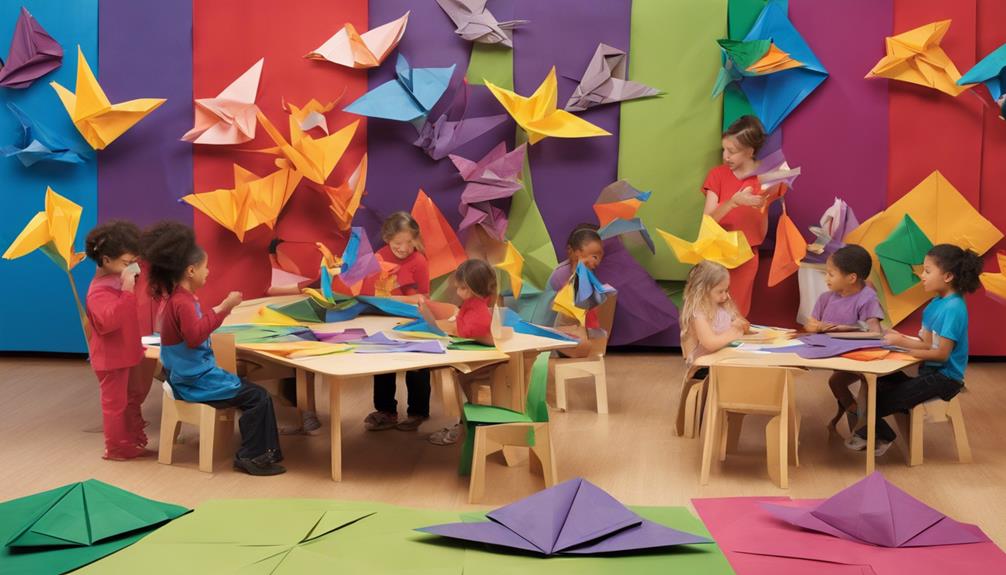Celebrating your child's unique voice and perspective is essential for fostering their sense of self and building confidence. Let's actively listen to their thoughts, showing genuine interest and empathy, which helps them feel valued and respected. Encouraging self-expression through art and imaginative play not only nurtures creativity but also enhances emotional and cognitive growth. By providing a supportive environment and celebrating their achievements, we empower them to pursue their interests and celebrate their individuality. Teaching diversity and modeling inclusive behavior further enriches this nurturing process. Join us in exploring more ways to honor and support your child's unique qualities and growth.
Key Takeaways
- Recognize and honor your child's individuality to foster a strong sense of self.
- Encourage self-expression through artistic outlets to boost confidence and emotional intelligence.
- Actively listen to your child's thoughts to show value and build trust.
- Celebrate and accept your child's unique traits to create a nurturing environment.
- Model inclusive behaviors and encourage open conversations to teach diversity and inclusion.
Understanding Their Individuality
Recognizing and honoring our child's individuality is the first step in helping them develop a strong sense of self. When we focus on celebrating and accepting their unique traits, we create a nurturing environment where they feel valued. Children understand themselves better when we acknowledge their personal strengths and personality styles. By doing so, we help them build a solid foundation of self-esteem and personal growth.
It's important to remember that every child is different. We need to communicate effectively, respecting these differences, and showing empathy. Instead of comparing them to others, we should highlight what makes them special. This approach encourages them to see their individuality as a strength rather than a challenge.
Celebrating our child's unique voice and perspective not only strengthens our bond with them but also fosters mutual understanding. It's about listening to their thoughts, valuing their opinions, and making them feel heard. This supportive atmosphere enables them to be more open and honest, promoting a healthy parent-child relationship.
Encouraging Self-Expression

Encouraging self-expression in our children is crucial for opening doors to artistic outlets that help them explore their creativity and emotions.
We must maintain open communication channels, actively listening to their thoughts and feelings, so they know their voices matter.
Artistic Outlets Matter
Artistic outlets like drawing, painting, and music give children a dynamic platform to express themselves creatively and authentically. When we encourage our children to engage in these activities, we're providing them with essential tools for self-expression.
Artistic activities boost their confidence, helping them navigate challenges with a sense of accomplishment. They also foster problem-solving skills, allowing children to approach issues from different angles.
Research shows that engaging in artistic expression can enhance cognitive development, emotional intelligence, and social skills. Children who draw, paint, or play music often display improved emotional expression, making it easier for them to communicate their thoughts and feelings.
This development is vital as it helps children explore their emotions and develop a sense of identity.
Open Communication Channels
Creating open communication channels with our children allows them to express themselves freely and builds a foundation of trust. When we actively listen to our children, we promote a deeper understanding of their emotions, thoughts, and unique perspectives. By validating their voices, we show genuine interest in their opinions and experiences, reinforcing their sense of value and importance.
To create a safe and supportive environment, we should encourage our children to share their thoughts and ideas without fear of judgment. This involves not only listening but also responding in a way that makes them feel heard and respected. By doing so, we empower them to express themselves authentically, fostering confidence and self-awareness.
Open communication isn't just about talking; it's about creating a space where our children feel comfortable discussing anything, from their daily experiences to their deepest concerns. We need to be approachable and patient, allowing them to take their time and express their feelings fully. This process not only strengthens our bond but also helps our children develop healthy communication skills that will benefit them throughout their lives.
Valuing Their Thoughts

Actively listening to our child's thoughts and opinions shows them that we value what they have to say. When we accept and celebrate their ideas, we build a foundation of trust and respect. It's important to ask questions, not just to understand their perspective better, but also to show genuine interest in their thoughts. This approach encourages them to share more and helps them feel heard and appreciated.
Valuing our child's thoughts doesn't just strengthen our relationship; it also boosts their self-confidence and critical thinking skills. When they see us taking their opinions seriously, they're more likely to believe in their own abilities and trust their judgment. This validation empowers them to embrace their individuality and express themselves authentically.
Moreover, recognizing and respecting their perspective teaches them that their voice matters. It promotes a sense of self-worth and encourages them to engage in meaningful conversations, both at home and in other settings.
Embracing Their Creativity

Let's encourage our children's artistic expression by providing them with materials and opportunities to draw, paint, and tell stories. These activities nurture their unique voice and perspective.
By also fostering imaginative play, we can help them build self-confidence, communication skills, and a rich sense of creativity.
Together, we'll support their exploration of various creative outlets, allowing them to develop their individuality and a strong sense of accomplishment.
Encouraging Artistic Expression
Embracing our children's creativity through artistic expression not only enhances their critical thinking but also bolsters their emotional intelligence. By encouraging them to explore art, we're giving them a platform to communicate their unique voice and body language. Art becomes a safe space where they can express thoughts and emotions that they might not be able to articulate verbally.
When we celebrate their artistic talents, we nurture their self-esteem and encourage self-expression. Art allows children to share their perspectives, experiences, and feelings in ways that are deeply personal and authentic. By providing them with opportunities to create, we foster their imagination, problem-solving skills, and resilience.
| Benefit | Description | Impact |
|---|---|---|
| Creativity | Exploring new ideas and techniques | Broadens thinking, enhances innovation |
| Emotional Intelligence | Expressing feelings and emotions through art | Develops empathy, emotional awareness |
| Self-Esteem | Receiving positive feedback and encouragement | Builds confidence, reinforces self-worth |
| Communication | Using art to convey messages and stories | Enhances ability to express complex concepts |
| Resilience | Overcoming challenges in the creative process | Strengthens problem-solving, adaptability |
Celebrating their artistic creations not only builds their confidence but also celebrates diversity and encourages individuality. Let's make sure we provide them with the tools and support they need to thrive creatively.
Nurturing Imaginative Play
When we nurture imaginative play, we're fostering an essential aspect of children's development that enhances creativity and problem-solving skills. Through imaginative play, children explore their unique perspectives, voice, and creativity. It's not just about fun; it's about helping them grow into well-rounded individuals.
Engaging in imaginative play promotes cognitive flexibility and emotional intelligence, allowing children to navigate various scenarios and develop empathy.
We can encourage imaginative play by providing diverse materials and opportunities for open-ended play. Simple items like cardboard boxes, dress-up clothes, and art supplies can become tools for children to create their own worlds.
As role models, we should participate in their play, showing that creativity and imagination are valuable. By doing so, we validate their ideas and encourage their sense of agency and self-confidence.
Research indicates that imaginative play enhances language development and decision-making skills, essential aspects of early learning. By fostering an environment that embraces creativity, we help children express themselves authentically.
Let's celebrate their unique voices by nurturing their imaginative play, knowing that we're building the foundation for their future success and happiness. Together, we can create a supportive space where their creativity can flourish.
Building Confidence

Encouraging children to express themselves creatively and share their ideas helps build their confidence and sense of self-worth. To truly support our children's growth, we must first recognize the importance of their unique voices.
When we help our children understand that their thoughts and perspectives matter, we lay a foundation for strong self-esteem and confidence.
Providing opportunities for them to share their ideas, whether through art, storytelling, or simple conversation, reinforces this. By actively listening and celebrating their contributions, we show them that their voice is valuable.
This acknowledgment empowers them to embrace their individuality and feel more confident in expressing themselves.
Another key aspect is creating an environment where children feel safe to be authentic. Encouraging them to pursue their interests and passions without fear of judgment promotes a sense of belonging and well-being.
When they see that their unique perspective is respected, they're more likely to develop a healthy sense of self-worth.
Teaching Diversity and Inclusion

Teaching diversity and inclusion means helping our children understand and appreciate the rich tapestry of human differences. To promote this understanding, we need to model inclusive behaviors and attitudes. When children begin noticing differences, we should provide examples of acceptance, effective communication, and care for others. By doing so, we create an environment where diversity is celebrated and appreciated.
We must correct biases and encourage open conversations by redirecting unaccepting language or behavior. Make sure to celebrate diversity from a young age, using resources like diverse children's books and emotional competence programs. These tools can help children see the world from different perspectives and develop empathy.
It's also essential to stay informed and connected. Subscribing to newsletters, blogs, and resources that focus on equity, preschool education, and promoting diversity can equip us with the knowledge and tools needed to support our children's growth. By staying engaged, we can make certain that our children are learning in an environment that values and respects all individuals, helping them understand the importance of diversity and inclusion from the start.
Let's commit to fostering a world where everyone feels valued and included.
Active Listening Techniques

Active listening transforms how we connect with our children, demonstrating genuine care and interest in their thoughts and feelings. By actively listening, we show children that their voices matter. Effective communication begins with using body language, maintaining eye contact, and avoiding interruptions. When we lean in, nod, and maintain eye contact, our kids feel truly seen and heard.
We need to focus on what our children are saying without jumping in with advice or opinions. It's crucial to let them complete their thoughts before we respond. This practice builds trust and helps children feel understood, fostering a deeper emotional connection. By creating a safe space for them to express themselves, we encourage openness and honesty.
Active listening also involves reflecting back what our children have said. Phrases like 'It sounds like you're feeling…' or 'I hear you saying…' can validate their emotions and clarify their perspectives. This kind of response not only shows children that we're paying attention but also helps them articulate their thoughts more clearly.
Implementing these active listening techniques can greatly improve our relationships with our children, leading to more effective communication and a better understanding of their unique perspectives.
Creating a Supportive Environment

Creating a supportive environment for our children involves fostering a space where they feel safe, valued, and free to express themselves. From a young age, it's important to encourage open communication and active listening. When our children know that we genuinely care about their thoughts and feelings, they feel more confident in sharing their unique perspectives about the world around them.
We can start by validating their experiences and emotions, showing them that their voices matter. By asking open-ended questions and really listening to their answers, we help them feel heard and understood. Additionally, providing opportunities for self-discovery and creativity, such as art projects, storytelling, and imaginative play, empowers them to explore their identities and express themselves authentically.
Recognizing and celebrating their individuality promotes a positive self-image and boosts their self-esteem. Whether it's acknowledging their small achievements or simply appreciating their unique qualities, these positive reinforcements build a strong foundation for their confidence.
As we create this nurturing environment, we empower our children to embrace their authentic selves and share their voices with the world. In doing so, we help them develop a strong sense of identity and the courage to express their unique perspectives.
Celebrating Their Achievements

Acknowledging our child's achievements is essential for building their confidence and self-esteem. When we celebrate their efforts and progress in areas like academics, sports, arts, and social interactions, we help them realize their potential. Recognizing and praising their unique talents, skills, and strengths can greatly boost their self-esteem, making them feel valued and appreciated.
Encouraging our child to set goals and work towards them is another effective way to celebrate their achievements. As they reach milestones, we should celebrate these moments, fostering a positive mindset and motivation. It's important to highlight not just the end results but also the hard work and determination they put in along the way.
Creating a supportive environment plays an important role in this celebration. When our child feels safe and encouraged to express their thoughts, ideas, and aspirations, they're more likely to thrive. Celebrating their achievements strengthens our bond with them, creating shared moments of pride and joy that enrich our relationship.
Frequently Asked Questions
How Do You Acknowledge Each Child's Uniqueness in Positive Ways?
We acknowledge each child's uniqueness by recognizing their individual strengths and qualities, fostering a supportive environment where differences are valued.
We encourage self-expression through creative activities, allowing children to make choices that build confidence and independence.
Why Is It Important to Recognise That Each Child Is Unique?
Recognizing that each child is unique is essential because it helps us provide personalized support, fostering their growth and confidence.
When we acknowledge their individuality, we boost their self-esteem and sense of belonging.
This understanding promotes empathy and respect for diverse perspectives, creating a more inclusive environment.
How to Write in the Perspective of a Child?
To write from a child's perspective, we need to capture their innocence and unique world view. Let's use simple language and short sentences, reflecting their cognitive level.
Observing real children helps us understand their emotions and reactions. We should incorporate their curiosity and wonder, and avoid complex vocabulary.
Why Is the Child's Voice Important?
We believe the child's voice is vital because it fosters self-esteem, creativity, and social-emotional growth.
When we lend an ear to their thoughts, we build trust and help them feel understood, which boosts their confidence and decision-making skills.
Their voices evolve with age, reflecting new challenges and perspectives, so it's imperative to celebrate and respect their unique contributions at every stage of their development.
Conclusion
By celebrating our child's unique voice and perspective, we foster their confidence and self-worth.
Did you know that children who feel heard and valued are 60% more likely to excel academically?
Let's continue to actively listen, encourage their creativity, and embrace their individuality. Creating a supportive environment where they can freely express themselves is key.
Together, we can nurture their growth and help them thrive, ensuring they feel seen, heard, and deeply appreciated.









